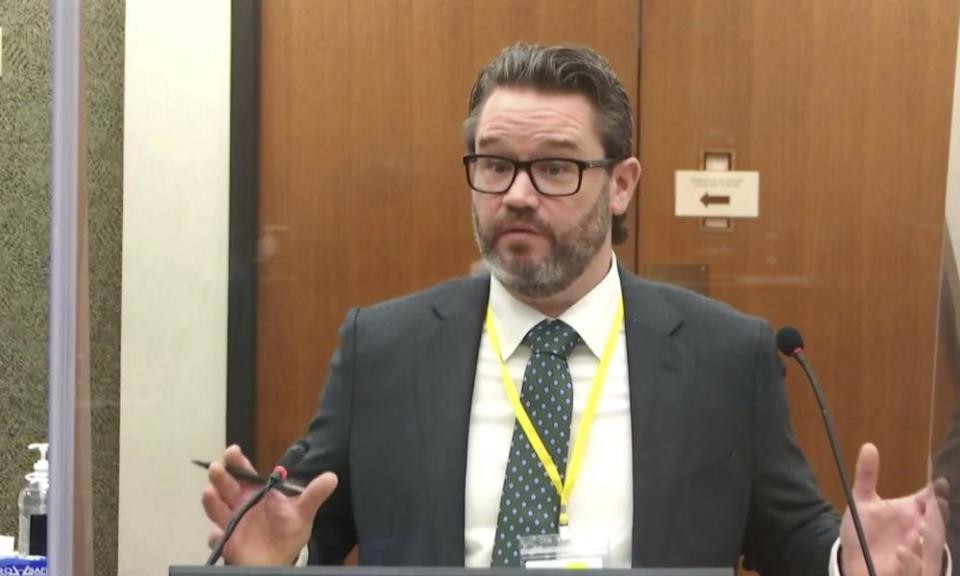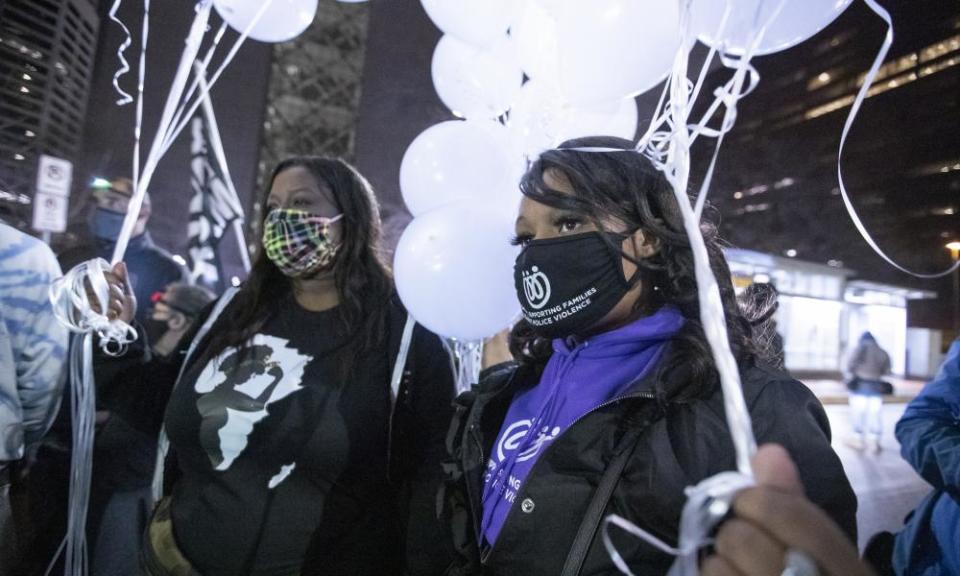Chauvin’s defence faces uphill battle after prosecution undercuts case

Derek Chauvin’s trial opened last month with his lawyer telling the jury there was much more to George Floyd’s death than the now notorious video that prompted global protests for racial justice and landed the former police officer with a murder charge.
Eric Nelson laid out the pillars of his defence of Chauvin, the former Minneapolis officer filmed kneeling on Floyd’s neck for more than nine minutes, in his opening statement. He said there was an untold story of drug intoxication, a failing heart, a hostile mob, and a police officer doing the best he was trained to do.
Nelson also had a card up his sleeve: an official autopsy that made no mention of Floyd having the breath squeezed out of him, as the prosecution claimed, but which did talk about a heart condition and illegal drug use.
Related: Derek Chauvin trial: George Floyd was ‘a person everybody loved’, brother says
The defence lawyer promised the jurors that by the time they heard all the evidence, “common sense” would require them to acquit the former policeman who has denied charges of second and third degree murder, and manslaughter, over Floyd’s death last May.
But as Nelson begins to present his case on Tuesday, he will be confronted with persuading a jury that has listened to a parade of prosecution witnesses who already appear to have done considerable damage to his case.
Watch: George Floyd's family testifies as prosecution prepares to rest their case
Nelson is presenting two key arguments. He says that whatever actions Chauvin took were reasonable and followed his training as a police officer, and that in any case those actions are not what killed Floyd.
“You will learn that Derek Chauvin did exactly what he had been trained to do over the course of his 19-year career. The use of force is not attractive, but it is a necessary component of policing,” he told the jury.
But that will be a harder line for Nelson to push after no less than eight of Chauvin’s former colleagues in the Minneapolis police department, including the head of the murder squad, told the jury that digging a knee into a suspect’s neck as a means of detaining them was never authorised. Remarkably, those testifying against Chauvin also included the city’s police chief, Medaria Arradondo, who fired him the day after Floyd’s death and called it “murder”.
“It’s not part of our training, and it is certainly not part of our ethics and our values,” he said of Chauvin’s conduct.
Defence lawyers frequently tell juries trying police officers not to second-guess those who have to make split-second life-and-death decisions. But that is going to be a difficult argument to present in the face of video that shows Chauvin pressing his knee down on a passive Floyd with plenty of time to decide on his actions.
Likewise, a jury might decide that Nelson’s claim that Chauvin and the three officers with him faced a hostile mob, which distracted them from focussing on Floyd’s growing struggle for life, is not what they see on a video showing bystanders mostly pleading with Chauvin to lift his knee.
But perhaps the biggest obstacle the defence now faces is the wealth of testimony from medical experts about how Floyd died.

Nelson went into the trial armed with an official autopsy that is ambiguous enough on the cause of Floyd’s death to provide fertile ground for sowing reasonable doubt.
The Hennepin county medical examiner, Dr Andrew Baker, concluded that the detained man died of “cardiopulmonary arrest complicating law enforcement subdual, restraint, and neck compression”. Baker listed heart disease and illicit drug use as “other significant conditions”.
Nelson boiled that down to Floyd dying from a coronary condition combined with the use of powerful illegal drugs found in his system, the opioid fentanyl and methamphetamine.
Crucially for the defence, the medical examiner said nothing about lack of oxygen or asphyxia.
This was clearly a problem for the prosecution. In different circumstances, it might have been expected to lead the medical evidence with the findings of the official autopsy and then put experts on the stand to back them up.
Confronted with Baker’s conclusions, the prosecution did the reverse. It had a succession of medical experts state unequivocally that Floyd died because he couldn’t breathe under the grip of the police officers.
One medical witness in particular, an Irish-born pulmonologist, Dr Martin Tobin, held the jury’s attention for hours as he gave clear explanations of complex medical issues. He said that Floyd died because he was caught in a “vice” between Chauvin and the street that all but stopped him breathing
“It was almost to the effect that if a surgeon had gone in and removed the lung,” he said.
Related: ‘Excited delirium’: the controversial defense that could be used in the Chauvin trial
Everything else – brain damage and then heart failure – had followed from that.
Tobin’s conclusions were backed by another witness, Dr Lindsey Thomas, a medical examiner who trained Baker. She said the autopsy could not be considered in isolation from the video evidence of the police pressing Floyd into the street.
By the time Baker took the stand, all the prosecution had to do was to get him to agree that the autopsy offered a conclusion on the moment of Floyd’s death – that his heart gave way – but not what caused that to happen. Baker obliged by telling the jury that whatever the condition of Floyd’s heart or the impact of the drugs in his system, he would not have died on that May evening if the police officers had not set in train the collapse of his system.
While the autopsy is still a potential chink in the prosecution’s armour, Baker’s findings look less like a winning card in raising reasonable doubt than at the beginning of the trial.
Now a Minneapolis jury, and millions of Americans, wait to see whom Nelson will produce as witnesses to say differently.
Watch: Derek Chauvin murder trial enters 3rd week amid protests over Daunte Wright shooting

 Yahoo News
Yahoo News 